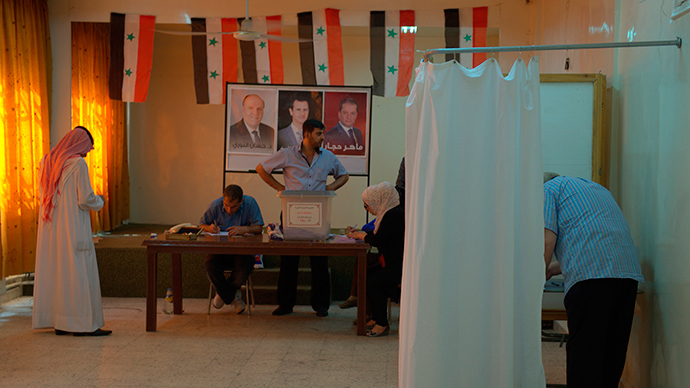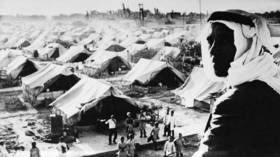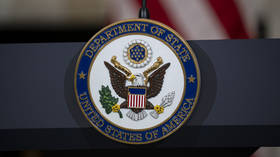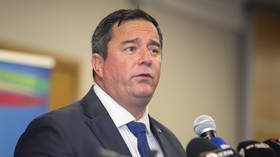Syrian govt to do utmost to 'create environment of safety and security' during elections

While the Syrian government tries to secure the presidential polls, the opposition is likely to resort to violence to discourage people from voting, as the vote won’t be in their favor, Professor of International Law Daoud Khairallah told RT.
RT:Rebels in Syria have vowed to disrupt the voting, and they have been stepping up attacks already. What are the chances they will indeed succeed?
Daoud Khairallah: I think the chances are dimming with time. The Syrian government and the Syrian people are getting more and more distant from the armed opposition. They realize now that there is not one opposition, there are many oppositions, and the collective work of these oppositions has been the destruction of the Syrian nation, the dismantling of the social fabric, especially when they resort to inciting sectarian fear. And all Syrians are now, more and more, realizing that what is at stake is the unity of the Syrian nation, and this is working in favor of the government of Bashar Assad.
RT:As a result of those threats, the government is stepping up security. Do you think it will be able to guarantee safety for the voters?
DK: It might be that the government will not be able to guarantee the safety of every district, of every town, every place where elections will take place, but the government has a duty to try its utmost to guarantee the safety and the security of citizens that are going to be voting because this voting is very significant. This is the source of legitimacy; the heart of legitimacy is the consent of people, and there is no alternative to the voice of people in freely electing what they want. The more people who come and participate in the election, the more eligible voters come to the voting booths, the more legitimacy it will give to this government. So this government has every interest in creating an environment of safety and security. It is expected also, and it is not unlikely, that everything we have seen from the armed opposition is resisting this election because they know ahead of time the outcome is not going to be in their favor, it is going to confirm the legitimacy of the ruling President Bashar Assad and his team. So it is likely that they will resort to violence to discourage people from going to the voting boots.
RT:Incumbent President Assad is poised to win the election. What will that victory mean for the war-torn country? What signal will it be sending to the West?
DK: It is difficult from one who is far away to predict exactly how it is going to be. But if we take into consideration the vote that has taken place already outside Syrian territories like in Lebanon and Jordan or wherever the Syrians were allowed to vote, it was a surprise to everyone those who went and voted, and it was way beyond everyone expected in terms of numbers and percentages. So if outside of Syria there was such an enthusiasm to go to vote, it is quite likely that the turnout is going to be high inside Syrian territories. All this will be subjected to sabotage the armed opposition may try to create.
RT:Washington has dubbed the upcoming election a farce, pointing out that it will be held only in government controlled areas. But we just had a presidential election in Afghanistan where parts of the country also remain under militant control and that vote was rather welcomed. Why such a distinction?
DK: There are some countries in the West who have taken a position questioning the legitimacy of President Assad – from the US President to his friends and allies in NATO, to some allies in the Middle East and the Arab world. They have been claiming, alleging, saying that Bashar Assad has no legitimacy and therefore, he should quit. Now if the voting on the ground will prove that the overwhelming majority of the Syrians who are able to vote are in favor of Mr. Assad, this will definitely create a reality that the world would have to take into consideration.

RT:The US acknowledged the legitimacy of the election that took place in Ukraine recently. But it already calls Syrian elections illegitimate. Isn’t it a double standard here?
DK: Double standard is the US practice in foreign policy and it is manifest between Israeli and Arab. Wherever the US has a country that it considers friendly or it promotes American interests, whatever it does, whatever an armed group does, the armed group that works in what the US considers its interests, come to be freedom fighters. The same kind of violence and the same kind of behavior by those who the US fears are not in their interests, become terrorists. So the double standard is a general practice and daily practice in the US, it’s not surprising at all. Wherever the US sees it has an interest, its position from the same facts becomes colored by these interests.
RT:The UN Chief Ban Ki Moon urged Syria not to hold the election, saying it will undermine efforts to achieve a political solution to the conflict. But how else can a political solution be achieved if not though the ballot box?
DK: Talking about Ban Ki Moon and his moral authority, speaking for the UN and his distance from certain countries of influence, including the US. We have to ask Mr. Ban Ki Moon what peaceful solution, what kind of success he achieved through the peaceful negotiations, how successful was he at Geneva to talk what he is talking about. I don’t think that having people express their feeling about their choice what government they want is something that would contradict any peace or any alternative solution that Mr. Ban Ki Moon might have in mind. What the UN has done so far and the success that it has incurred does not really give much room to the credibility of statements like the one by Mr. Moon.
RT:How important is this election to the country?
DK: These elections are extremely important. If we look at the way the Syrian crisis started, there were legitimate demands by people that they want reform. And then the outsiders entered the scene and have taken over this uprising, and introduced three destructive elements. One – resort to armed violence, two – allow foreign interference, three – resort to sectarian incitement. The resorting to armed violence made this uprising totally dependent on those who are going to provide those arms, training and money. Consequently, you have the two issues that the prudent guys in the opposition were aware of and tried to avoid. “No” to armed violence, “no” to foreign interference and “no” to incitement of sectarian feelings. The purpose of the opposite was to take over the uprising and manipulate and guide it in a way that would lead only to the destruction of Syria. After three years this is exactly what we see. Now the Syrian people have realized, and more and more realize what is at stake – is the Syrian nation, is the unity of society – and that is why these elections, some people might like or not like Mr. Assad, but they feel that he is a symbol of uniting the country, considering that the opposition is so many oppositions, and the collective work of this opposition has led to destruction of the country, eliminating and eclipsing any purpose that the uprising had in terms of reform. All the derivatives are not really messages for democracy, human rights, fighting corruption and all other things that the uprising wanted to see in Syria.
The statements, views and opinions expressed in this column are solely those of the author and do not necessarily represent those of RT.
The statements, views and opinions expressed in this column are solely those of the author and do not necessarily represent those of RT.












